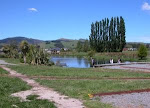New Zealand has very low density cities that have developed largely to rely on cars as the main form of transport. There are at least four things that are making that reliance on cars undesirable now and these are long term things that will continue into the future.
First and foremost is the rising cost of running a car. IRD currently puts the cost of car running at 83c per kilometre. On top of that, is the cost of parking. Garaging, or even just space on a section, costs you in terms of what you pay for that section and the rates you have to pay. In addition, the cost of car running to ratepayers and tax payers is at the level of billions per year in New Zealand in both road maintenance and injury from accidents. This is a lot of money for something that sits idle of around 95% of the time on average!
Second, Congestion. Cars take up a lot of road space – whether from parking on the roadside or the space needed when they are moving. We become most aware of this when we find ourselves sitting in slow moving traffic. Traffic congestion is a feature of many of our cities most days of the week and months of the year. We can never build our way out of this congestion because more cars just come in to fill up the space on roads that are widened and the parking and congestion problems just increase over a wider area.
Third – they take up time. Every minute you are in a car is a minute that is not contributing much to your wellbeing. In comparison, walking or biking allow us to exercise while travelling to work and might mean we don’t have to take more time to exercise formally. More minutes are added to this when you get stuck in traffic. On top of that, the rising cost of running cars means we need to work more to earn the money to drive.
Fourth, they negatively affect physical and mental health and our productivity. Human beings are animals that need to move to stay both mentally and physically well as a recent article in the Listener pointed out. Many of us sit in our cars to go to work, then sit at a desk all day while at work and then sit in our cars to come home before sitting in front of the TV for the evening. Biking or walking to work results in better physical and mental health without you really having to try. It can also help you leave work at work rather than taking books and computers home.
Fifth, they are contributing to climate change which is costing all of us all in terms of extreme and more erratic weather. This includes bigger rain events and rising sea levels which are both contributing to more damaging floods. At the same time, we are experiencing more summer heat and as a result of that, longer droughts, and more fierce fires. The more fossil fuels such as petrol, or dieselthat we consume, the more extreme our weather will become and the less easy it will be for us to recover from these events as individuals, and as a city or country.


